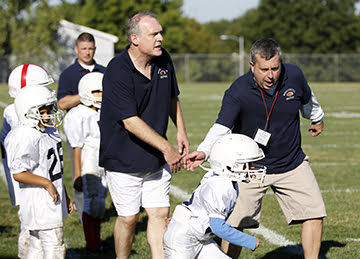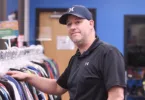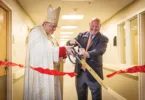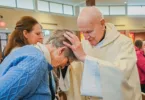
Lally sends in a substitution as his assistants Rob Podrebarac, center, and Damon Gardner look on. Lally started off as the team’s only coach, but was quickly joined by volunteers Lorenzo Hernandez, Podrebarac and Gardner.
Coach teaches kids to tackle life’s ups and downs
by Jessica Langdon
jessica.langdon@theleaven.org
The players poured their hearts into the game, but the fledgling football team just couldn’t put up much of a defense its first year.
Nor could the offense move the ball many yards.
No, the team certainly didn’t rack up a lot of points on the scoreboard.
Yet every boy on this brand-new third-and-fourth-grade Resurrection Catholic School at the Cathedral team was dying to do it all again when the second season started this summer.
“Even with the season they had [in 2012], my son could not wait for the season to start,” said Stacy Cowan, whose son Michael is a fourth-grader at Resurrection in Kansas City, Kan.
Michael doesn’t even worry about whether his team wins or loses.
When asked if he won, he says, “I had a good time!”
Cowan, Resurrection’s athletic director, gives a lot of credit for Michael’s positive attitude and the boys’ unwavering enthusiasm to the team’s head coach, Tom Lally.
As athletic director — and a mom — Cowan appreciates the impact a good coach and just being part of a team can have on a child’s life.
“Without people like Tom Lally stepping up and giving his time of his own free will, these kids would not have that constant,” said Cowan.
Lally and more than 1,500 other adults coach youth teams within the Catholic Youth Organization of Johnson and Wyandotte Counties.
And they play an important role in the development not only of young athletes, but of young men and women.
A coach has credibility with kids, said Peter Piscitello, CYO executive director.
“You’re rolling out the ball and letting them play,” he said.
But that’s just the tip of the iceberg, and many coaches might never know their true impact.
Kids look up to their coaches, sometimes even as father or mother figures, Piscitello knows.
And in CYO, there’s even more.
“It may be a lot of work — and it may be thankless work a lot of times — but you have an opportunity to impact a child in one of the greatest ways on earth: You have an opportunity to lead them to Christ,” said Piscitello.
Lally tackled a big challenge launching a new team in 2012 and impressed Piscitello with his dedication to sharing the tradition of youth sports.
“They never quit, they always play hard, and the kids seem excited to be out there,” said Piscitello.
Veteran player, new coach
Growing up in Kansas City, Kan., Lally savored his football and basketball seasons with the CYO while attending St. John the Baptist School.
His family never forced sports; they were just fun, good things to do.
He went on to play football at Bishop Ward High School.
Even with all those years on the field, Lally, a lifelong parishioner of St. John the Baptist, approached the start of Resurrection’s inaugural season just as new to coaching as a lot of the boys were to playing.
Which is saying something. This was the first time some of the kids had actually touched a football.
And it was the first time Resurrection Catholic School — which combined several parish schools when it opened as a consolidated school in 2007 — had its very own football team.
Like many other coaches in CYO sports, Lally — who is father to Madison, a freshman at St. Louis University in St. Louis; Lucy, a sixth-grader at Resurrection; and Tommy, a fourth-grader — has a kid on the team.
“I wanted to spend some time with my boy,” he said.
Lally’s wife Carrie, who was athletic director then, got on the phone and recruited help.
“All the parishes stepped up and said, ‘Yeah, we’ve got equipment we can lend you or that you guys can just have,’” said Lally. “So we spent $0 on football. And that’s the beauty of CYO — folks just coming together.”
Even though Resurrection’s school colors are red and white, the boys take the field in blue-and-white uniforms from one school — with helmets from another.
They compete against the very teams that uniformed them.
Although Lally walked into the team’s first practice as the lone coach, right away Lorenzo Hernandez, another player’s father, introduced himself.
“From that simple, “Hey, Coach, can I help you?’ we’ve built a great friendship and relationship,” said Lally. “He is the mastermind behind the X’s and O’s.”
Together with assistants Rob Podrebarac, who grew up with Lally, and Lally’s neighbor Damon Gardner, who doesn’t have kids this age but wanted to help, the men are teaching kids the right way to play on the field and also, they hope, in life.
Shaping lives
Lally coaches in a different era than he played in.
“We’d have three practices a day. Our coach wouldn’t give us water, and we would run and run and run,” he said. “But that toughened us up. He was smart about it.”
Today, even coaches can be seen running to the field to squirt water into a player’s mouth or hefting a package of Gatorade onto the sidelines.
But Resurrection players aren’t being coddled.
“I want to be tough,” emphasized Lally. “Part of any success I’ve had in my life, I attribute directly to football and our high school coaches.”
Running the field on sweltering days of three practices worked Lally’s high school team hard.
Coach Greg Beggs at Bishop Ward tried to drive home an important point to his sweaty, exhausted high school players — who weren’t necessarily ready to soak it up at the time.
“He would look us in the eye and say, ‘You know what? I’m not going to make you do anything that I already haven’t done myself,’” recalled Lally, who today is executive director at Heartland Habitat for Humanity.
“To this day, that’s the philosophy that I use in management,” he said. “Why would my team at Heartland Habitat want to follow me if I haven’t done everything I’m asking them to do?
“So athletics are wonderful, but it’s a precursor. It’s a learning lab for life and for leadership and management.”
And he hopes that lesson is reaching even these young players.
Mauricio Castaneda proves that even the smallest details are sticking.
“Oh Mom, I’m going to sleep and I’m going to eat healthy because my coach said that,” the third-grader at Resurrection tells his mother, Rosa Guerra.
Guerra worried at first when Mauricio wanted to play a sport.
Football was brand new to him.
She watched the coaches spend extra time guiding him through the basics at the start and felt her fear quickly transform into soaring pride.
“Sometimes, I cry,” she said, her hand rising to her chest as she watched the last game of the season in late October.
She could tell Mauricio was running faster and he’d toned up.
What mattered even more were the friends he’d made and a new sense of independence.
“I will never forget in my life that Tom helped my son,” said Guerra.
Lally remembers how reserved Mauricio seemed at first.
“Now, he’s coming after me,” he said. “It’s so fun to see.”
Those everyday victories matter to him more than the score, especially for kids this age when much of life revolves around school, friends, video games and even post-game pizza.
Ups and downs
“I think winning’s overrated sometimes,” said Lally. “”I know you learn so much more through practice, through adversity, through loss sometimes — all the time, quite frankly.”
He got a taste of how true that was during his senior football season at Ward.
“We were pretty darn good,” he said.
With an 8-0 record, the team was ranked near the top in the metro area and the state.
But they had to win all three district games to advance to state, and a meeting with Bishop Miege High School in Roe- land Park for the last game of the regular season shattered the dream.
“Miege gets us, so our season’s done,” said Lally. “And I’ll never forget that feeling. You work so hard and you don’t achieve what is meant for you to achieve — and that’s just a great life lesson.”
No one goes through sports — or life — absolutely undefeated.
“How you react to those downturns is really what defines you,” he said.
Mere months ago, the boys he coaches were just feeling out how to interact.
Now, they’re real players who help their teammates off the ground and mean it when they say, “Hey, good job,” to the other team.
That’s not to say Lally doesn’t cherish every success on the field.
During the dismal first season, he’d tell the opposing teams’ coaches that this team wouldn’t present much competition.
The other coaches laughed it off, but often agreed by the start of the second half, he said.
But then the Resurrection team got its first taste of magic on the field.
“This team was beating us pretty bad, just dominating us,” said Lally. “And because it’s the CYO, the coach of the other team told his players, ‘OK, let them have some fun.’”
He’ll always remember what happened.
“My boy had the ball and he’s running, and the other team is kind of not tackling on purpose,” he said. “And I’ll never forget the joy on my boy’s face — and the entire team — when we scored a touchdown.”
This year’s season didn’t start out much better than last, but toward the end, something started to really click, and kids took turns stepping up.
They even logged a few wins.
“The coolest thing in the world was at the end of Saturday’s game, those referees who’ve been refereeing us all year stopped the coaches and said,
‘You guys have improved so much from day one to now,’” said Lally.
Safety net
When families sign their children up for any sports, they understand playing carries risks.
Football, especially, has received attention in the news recently regarding the potential long-term damage done by multiple concussions and repeated hits.
Brett Favre, a longtime quarterback in the National Football League, recently added his name to the long list of players with problems — in his case, memory loss.
And yet at any kids’ game, crowds of supportive parents cheer from the stands.
“They’re teaching them how to tackle with the head up and tackle with your shoulder,” said Luis Pineda, whose son Lorenzo, a third-grader, is one of several players on the Resurrection team from Christ the King School in Kansas City, Kan.
“If someone does it wrong, they’re pulled to the side and given individual coaching, so that way no one’s lacking,” said Pineda.
They don’t want anyone — their own kids or kids on the other team — to get hurt.
Lorenzo was drawn to this team because it was tackle football; he wasn’t as interested in a flag team.
“It’s the way you play it,” said Pineda. “They grow up learning it.”
Lally believes coaching good fundamentals now reduces the risk of all types of injuries.
“The loudest I will ever yell at a player is when they put their head in first,” he said. “We stress, we stress, we stress: fundamentals, heads-up football, proper tackling techniques.”
Many coaches were already limiting the amount of contact time in practice when the CYO made it official — no more than 50 percent.
Trainers at the games keep watch on injuries and are quick to pull kids off the field.
Maggie Thomas, whose son Trey is a fourth-grader at Resurrection, believes playing presents too many benefits to sideline kids over worries.
“Number one was just the teamwork, working on a team and being involved — and also for the exercise,” she said. “It’s hard to get them even to just go outside and play, so at least I know he had to go to practice three times a week and a game every Saturday.”
Positive coaching plays a big role.
The coach tells the kids when they’ve done something wrong (as Lally puts it, they get “coached up”), but it’s always in a way that helps them improve.
Trey appreciates that.
“He’s always pumping them up, building their self-esteem,” said Thomas.
The boys come to football and know they’re going to be praised for the good work they do, too, said Lally.
Extended family
Lorenzo goes to a different school than many of his teammates, but that hasn’t prevented him from making some good friends.
In fact, said his dad, Lorenzo’s invited teammates to come over and play catch at their house, and he anticipates a happy reunion — and a good-natured rivalry — when Resurrection and Christ the King face each other on the basketball court soon. (Lally and Hernandez will both be coaching RCS’s basketball team as well.)
Friendships built up through CYO play extend to the parents as well.
The families of the kids he coaches, said Lally, are wonderful, supportive people, and he’s enjoyed watching them bond with each other in the stands.
The community is diverse, and many parents work long hours and make significant sacrifices to give a Catholic education to their children — as well as the opportunity to participate in CYO.
That sometimes means making accommodations for players.
Lally understands if a family has only one car and the parents need it for work; a child is never penalized if he can’t get to practice.
Cowan agreed.
Coaches sometimes have to be Mom or Dad, she said, and they’re often the person children seek out after school if they just want to tell someone they got an A on a spelling test or nailed a correct answer in class — or want to lead the prayer at practice.
“We fill all kinds of roles in that hour and a half,” said Cowan.
And she always instills in her teams that they need to leave every place they go better than the way they found it.
Father Harry Schneider, rector at the Cathedral of St. Peter, sees those same qualities in Lally, too — both through his work with Habitat for Humanity and its ReStore and through the faith he lives.
“He is a person committed and dedicated to the community, to the church, to youth, and gives a great deal of his time and energy for the betterment of people in our whole community,” said Father Schneider.
Sports, academics and — most importantly — faith go hand-in-hand for Lally.
As they did for the coach who helped shape his approach to leadership — Greg Beggs, who died in 2008.
“At his funeral — it’s a testament to the coach — there are all these former players throughout the years who are returning to pay their respects, and everyone’s telling stories,” said Lally.
Passing it on
The lessons Coach Beggs taught are now being passed on to a new generation of players through one of his former players.
And even though the coaches want the kids to have fun and learn the fundamentals today, they have their sights set on the future.
Lally asks Bishop Ward’s players and coaches to share advice with his team whenever they can, and hopes one day these younger boys will find themselves in the older players’ shoes.
“I see it — and Coach Lorenzo sees it — as our responsibility to really train the next generation of football players and athletes at Bishop Ward,” said Lally. “I think we all know and believe what being involved in athletics at the high school level meant for us.
“We want that for our kids and for the school.”






